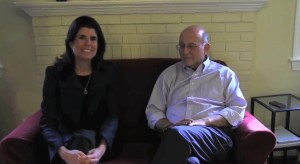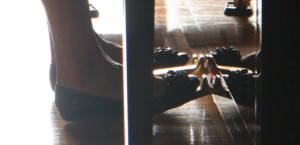Last year, a friend’s exuberant performance of seven Beethoven Bagatelles prompted me to learn one myself. The brevity of each piece was appealing, but more so were the varying range of emotions I heard throughout the music. Yes, several featured Beethoven’s magnificent power and intensity, but what piqued my interest was the joy and playfulness.
When my teacher played the second of the 11 bagatelles of Opus 119, I was smitten, not only because of the music, but also with the incessant physicality of the composition. From the outset of the two pages, and continuing through to the last few measures, my teacher’s arms constantly crossed back and forth. I watched her glide through this acrobatic feat and I couldn’t escape feeling like an envious child watching another swing gracefully across the monkey bars. Although my teacher made the arm movements seem easy, I knew it would be anything but easy for me.
I thought the steady crisscrossing of arms would not only be fun, but would also force me to get my physical self involved with the music, not just my mind. In C major, the notes were straightforward, and throughout the piece a series of triplets in one hand were played against eighth notes in the other. My challenge was to maintain the two-four rhythm as the triplets and eighth notes changed hands.
Seated at the Steinway O in my living room, I practiced releasing my fingers off of the keys in each hand, so that I was able to cross each arm and reach the other register in time.
This was difficult, but I was inspired and surprised at how much I was enjoying Beethoven. During my brief stint with piano lessons as a child, my mother had placed a menacing bust of Beethoven on the piano, which, along with a stultifying teacher, had scared me off the piano altogether. I would never have suspected that one day I would be so enthralled with his music.
In a few months I had learned the piece well enough and planned on performing it at our year-end party in June. Although far from perfect, I felt reasonably proficient on the mechanics of the music, and in my daily practice I was now trying to capture the friskiness shifting from hand to hand. As luck would have it, Nancy M. Williams asked to film me playing the music the same afternoon as the year-end party. With the video camera running, I played it three times, and both she and I were reasonably satisfied with one of the performances. I couldn’t have had a better dress rehearsal for that evening.
Regrettably, my nerves took over that night, and my anxious longing to share my joy with the audience kept me from doing so. I was able to play through the music without stopping for mistakes, but I didn’t convey any of the fun I had been having with the bagatelle. Hopefully I will be able to relax with more practice and achieve that joy in the future. Regardless, I have put the past behind me and have now started on learning another, the first in this series of 11 Beethoven Bagatelles. Although there are no physical gymnastics, the minor key of G is allowing me to discover a more somber side of Beethoven. Who could ask for more?
 look inside |
Complete bagatelles (Piano Solo). By Ludwig van Beethoven (1770-1827). Edited by Otto von Irmer. For Piano. Piano (Harpsichord), 2-hands. Henle Music Folios. Urtext edition-paper bound. Classical Period. SMP Level 10 (Advanced). Collection. Introductory text and performance notes. 55 pages. G. Henle #HN158. Published by G. Henle (HL.51480158)  (2) …more info |




Wonderful Robin!
thank you Rene!
I love your tenacity, Robin. You understand and respect the process! It’s just as much about uncovering the music and discovering the layers of beauty for ourselves, as it is about communicating it to others. Keep going! xo
I’ve only recently discovered this blog/website. VERY nice, Robin, and I appreciate you sharing of your experiences so eloquently, as I am an adult student who has returned to lessons in this past year (for the first time in decades), and relate to so much.
Thank you for those very kind words, Jean. I hope you continue to read Grand Piano Passion as you return to piano lessons. It is sometimes so difficult but always so worth the struggle. I have a new essay coming next week on learning to memorize Schumann. Happy new year, and good luck with the lessons.